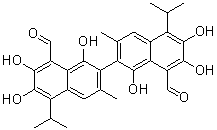
AT-101 (R-(-)-gossypol acetic acid) is a polyphenolic compound isolated from cottonseeds. AT-101 induces Apoptosis through activation of caspase-9, -3, and -7 in VCaP cells. It inhibits Bcl-2 by acting as a BH3 mimetic and disrupts the heterodimerization of Bcl-2 with proapoptotic family members. AT-101 was found to mimic the proapoptosis proteins and is able to bind to the BH3 domains of Bcl-2, Mcl-1, and Bcl-xL. AT-101 has been shown to be therapeutically active as a single agent in several mouse models including breast, prostate, colon, and non-small cell lung cancer. We demonstrate that AT-101 administration delays the onset of androgen-independent prostate cancer in vivo. The use of AT-101 and ADT may further delay the onset of AI disease, resulting in prolonged progression-free survival of prostate cancer.
| Cell Experiment | |
|---|---|
| Cell lines | HDMEC, OSCC3, UM-SCC-17B, UM-SCC-74A cells line |
| Preparation method | SRB assay Sulforhodamine B (SRB) cytotoxicity assays were done as described (25). Briefly, cells were seeded at 2×103 cells per well of 96-well plates, allowed to attach overnight, and treated with AT101 and/or taxotere for 72–96 hours. Cells were fixed with 10% trichloroacetic acid, stained with 0.4% SRB (Sigma-Aldrich, St. Louis, MO) in 1% acetic acid, and plates were read in a microplate reader at 560 nm (GENios; Tecan, Graz, Austria). Test results were normalized against initial plating density and drug-free controls. Data were obtained from triplicate wells per condition and is representative of three independent experiments. |
| Concentrations | 0~100µM |
| Incubation time | 72-96 h |
| Animal Experiment | |
|---|---|
| Animal models | SCID Mouse Model of Human Tumor Angiogenesis |
| Formulation | resuspended in carboxymethyl cellulose and sonicated for 30 minutes |
| Dosages | 10mg/kg daily or 70mg/kg weekly |
| Administration | orally |
| Molecular Weight | 518.56 |
| Formula | C30H30O8 |
| CAS Number | 90141-22-3 |
| Solubility (25°C) | DMSO Ethanol |
| Storage |
Powder -20°C 3 years ; 4°C 2 years In solvent -80°C 6 months ; -20°C 1 month |
| Species | Mouse | Rat | Rabbit | Guinea pig | Hamster | Dog |
| Weight (kg) | 0.02 | 0.15 | 1.8 | 0.4 | 0.08 | 10 |
| Body Surface Area (m2) | 0.007 | 0.025 | 0.15 | 0.05 | 0.02 | 0.5 |
| Km factor | 3 | 6 | 12 | 8 | 5 | 20 |
| Animal A (mg/kg) = Animal B (mg/kg) multiplied by | Animal B Km |
| Animal A Km |
For example, to modify the dose of Compound A used for a mouse (20 mg/kg) to a dose based on the BSA for a rat, multiply 20 mg/kg by the Km factor for a mouse and then divide by the Km factor for a rat. This calculation results in a rat equivalent dose for Compound A of 10 mg/kg.
| Related Bcl-2 Products |
|---|
| BAD (103-127) (human)
BAD (103-127) (human), the 25-mer Bad peptide, is derived from the BH3 domain of BAD, can antagonize the function of Bcl-xL. |
| Bim BH3, Peptide IV
Bim BH3, Peptide IV is a 26-residue peptide from BH3-only protein Bim, which belongs to the pro-apoptotic group of the Bcl-2 family of proteins. |
| Bax inhibitor peptide, negative control
Bax inhibitor peptide, negative control is a inhibitor of Bax. |
| Bad BH3 (mouse)
Bad BH3 (mouse) is a biological active peptide. |
| Bid BH3 (80-99)
Bid BH3 (80-99) is a biological active peptide. |


Products are for research use only. Not for human use. We do not sell to patients.
© Copyright 2010-2023 AbMole BioScience. All Rights Reserved.
